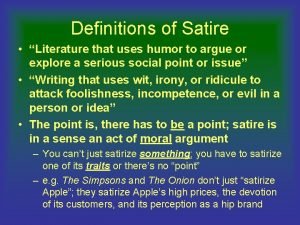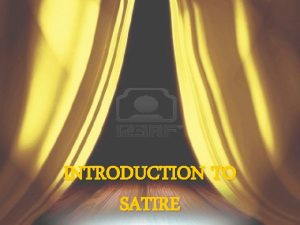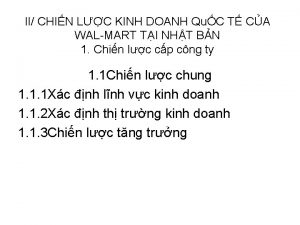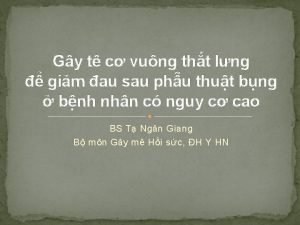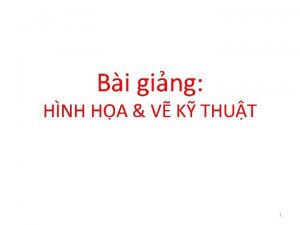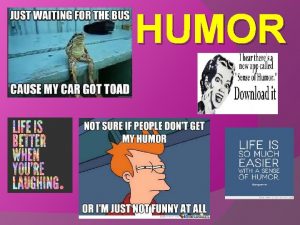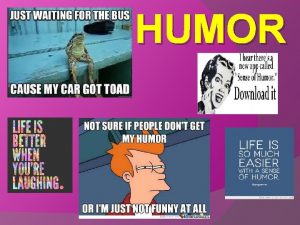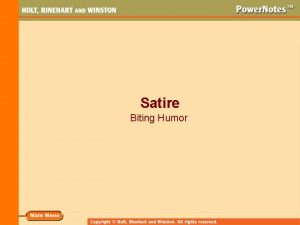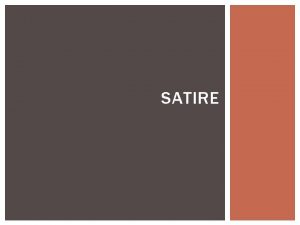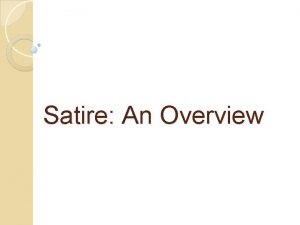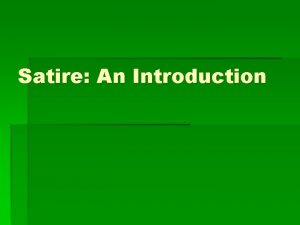Definitions of Satire Literature that uses humor to








- Slides: 8

Definitions of Satire • “Literature that uses humor to argue or explore a serious social point or issue” • “Writing that uses wit, irony, or ridicule to attack foolishness, incompetence, or evil in a person or idea” • The point is, there has to be a point; satire is in a sense an act of moral argument – You can’t just satirize something; you have to satirize one of its traits or there’s no “point” – e. g. The Simpsons and The Onion don’t just “satirize Apple”; they satirize Apple’s high prices, the devotion of its customers, and its perception as a hip brand

The Satirical Rhetor • Stands outside the text and makes implicit arguments that are often opposite to the characters’ or narrator’s views • Characters and plots in satire are only constructs for advancing the rhetor’s claims

2 Types of Satire • Horatian satire: – Inspired by the satire of Roman poet Horace – Gently derisive, aiming more for laughter than serious consideration of an argument – “Mapple Store”, i. Wheel ad • Juvenalian satire: – Inspired by the satire of Roman poet Juvenal – Harshly critical and extreme in its presentation; offensive as a call to action – 1984, “A Modest Proposal”, Brave New World

Conventions of Satire (conventions = characteristics of a genre) • Parody – using name, facts, or style/form of original – Satirists refer to relevant facts that must be understood in order to understand the implicit argument • e. g. the Mac “glow, ” sent from “i. Wheel”

Conventions of Satire • Exaggeration – Taking facts, characteristics, etc. to a ridiculous length to show their faults • e. g. “Apple is working on a new i. Wheel without a hard drive, keyboard, screen, or wheel. ” • Incongruity – Presenting things or people that are out of place or absurd in their surroundings – Any form of irony falls under this category • e. g. Princess Fiona knocks out Merry Men with her ponytail and pauses mid-flight to fix her hair.

Conventions of Satire • Reversal – Statements or situations demonstrating an absurd inversion of what is expected • e. g. My. Phonies cost more than regular earbuds – Some Particular Devices to Watch For • • Litotes Verbal and Situational Irony Hyperbole Diction that accentuates these techniques

Unit 2 Dystopias and Satire

Unit Questions • The characteristics and warnings of dystopia – What are the characteristics of a dystopia? – What makes a dystopia frightening? – What light can Orwell’s and Huxley’s dystopias shed on the direction of our society? • Satire – How do we recognize satire when we see it? – How can satire be used to make serious social points? – How do the depictions of dystopias in 1984 and BNW become satire?
